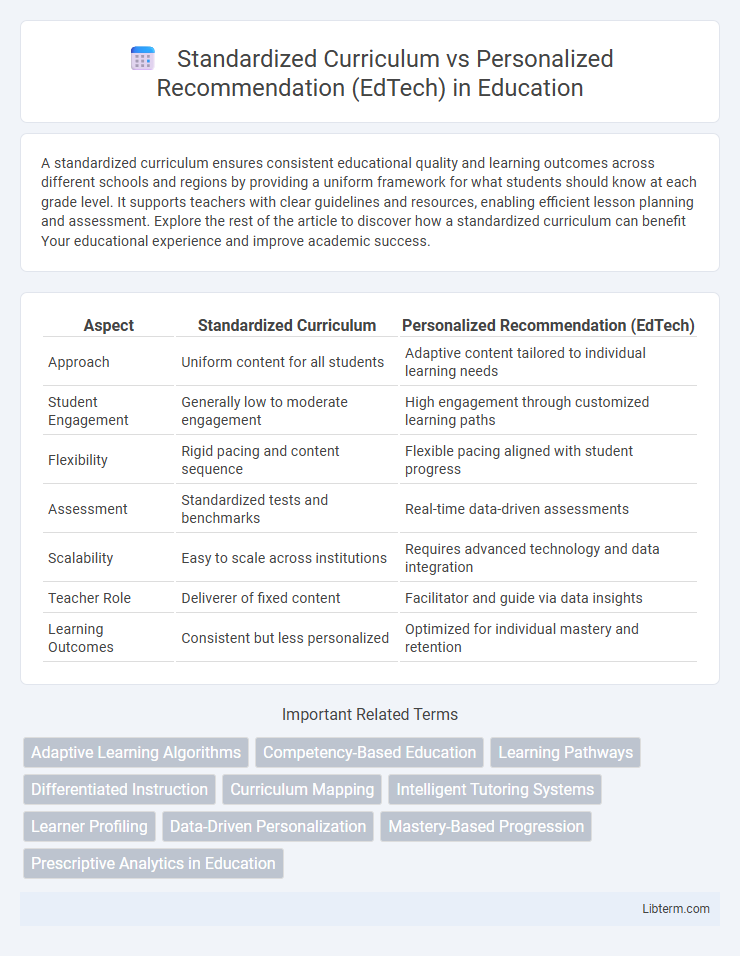A standardized curriculum ensures consistent educational quality and learning outcomes across different schools and regions by providing a uniform framework for what students should know at each grade level. It supports teachers with clear guidelines and resources, enabling efficient lesson planning and assessment. Explore the rest of the article to discover how a standardized curriculum can benefit Your educational experience and improve academic success.
Table of Comparison
| Aspect | Standardized Curriculum | Personalized Recommendation (EdTech) |
|---|---|---|
| Approach | Uniform content for all students | Adaptive content tailored to individual learning needs |
| Student Engagement | Generally low to moderate engagement | High engagement through customized learning paths |
| Flexibility | Rigid pacing and content sequence | Flexible pacing aligned with student progress |
| Assessment | Standardized tests and benchmarks | Real-time data-driven assessments |
| Scalability | Easy to scale across institutions | Requires advanced technology and data integration |
| Teacher Role | Deliverer of fixed content | Facilitator and guide via data insights |
| Learning Outcomes | Consistent but less personalized | Optimized for individual mastery and retention |
Introduction to Curriculum Strategies in EdTech
Standardized curriculum in EdTech offers consistent content delivery aligned with national or regional education standards, ensuring uniform learning outcomes across diverse student populations. Personalized recommendation leverages data analytics and AI to tailor educational resources and pacing to individual learner needs, promoting engagement and mastery. Curriculum strategies in EdTech increasingly blend these approaches to balance scalability with adaptability for optimized student success.
Defining Standardized Curriculum: Core Features
Standardized curriculum features a fixed, uniform set of learning objectives, content, and assessments designed to ensure consistency across different educational settings. It emphasizes alignment with national or regional academic standards, facilitating measurable outcomes and comparability of student performance. Key elements include structured lesson plans, prescribed textbooks, and standardized testing protocols that guide instruction and evaluation.
Understanding Personalized Learning Recommendations
Personalized learning recommendations in EdTech leverage data analytics and machine learning algorithms to tailor educational content to individual student needs, learning styles, and progress, enhancing engagement and knowledge retention. Unlike standardized curriculums, which offer uniform content for all learners, personalized recommendations adapt in real-time based on performance metrics and behavioral indicators, fostering a more dynamic and effective learning experience. Implementing adaptive learning platforms enables educators to address diverse learner profiles, optimize resource allocation, and improve overall academic outcomes through targeted interventions.
Key Differences Between Standardized and Personalized Approaches
Standardized curriculum in EdTech delivers uniform content and assessment to all learners, ensuring consistency and scalability across educational settings. Personalized recommendation systems adapt learning paths based on individual student data, such as performance metrics and learning preferences, enhancing engagement and knowledge retention. Key differences include the rigidity of standardized curricula versus the flexibility and responsiveness of personalized approaches, which leverage AI algorithms for tailored educational experiences.
Benefits of Standardized Curriculum in Education
Standardized curriculum in education ensures consistent learning objectives and equitable content delivery across diverse student populations, facilitating measurable academic outcomes and streamlined assessment processes. It provides a structured framework that aligns with national education standards, enabling educators to maintain quality control and support regulatory compliance effectively. Schools benefit from standardized resources and training, which enhance teaching efficiency and promote uniform skill development essential for standardized testing and college readiness.
Advantages of Personalized Recommendations for Learners
Personalized recommendations in EdTech enhance learner engagement by tailoring content to individual strengths, preferences, and learning pace, resulting in improved retention and motivation. Data-driven algorithms analyze performance metrics to identify knowledge gaps and suggest targeted resources, fostering efficient skill acquisition. This adaptive approach supports diverse learning styles, increasing accessibility and promoting continuous improvement compared to standardized curricula.
Challenges in Implementing Standardized Curriculum
Implementing a standardized curriculum in EdTech faces challenges such as limited adaptability to diverse student learning styles and varying regional educational standards. The rigidity of standardized content restricts personalized learning paths, often leading to disengagement and suboptimal outcomes for students with unique needs. Ensuring consistent quality while accommodating diverse educational requirements remains a significant obstacle for developers and educators.
Obstacles to Effective Personalized Learning
Standardized curriculum often limits personalized learning due to rigid content structures that do not accommodate diverse learning paces and styles, creating significant obstacles in EdTech applications. Personalized recommendation systems face challenges such as inadequate data integration, algorithmic biases, and privacy concerns that hinder accurate learner profiling and tailored content delivery. These obstacles reduce the effectiveness of personalized learning, highlighting the need for advanced adaptive technologies and robust data governance frameworks.
Technology’s Role in Bridging Standardization and Personalization
Technology in EdTech enables the integration of standardized curriculum frameworks with personalized learning pathways through adaptive learning platforms and AI-driven analytics. These innovations analyze individual student data to tailor content delivery while maintaining alignment with established educational standards and benchmarks. This fusion enhances learning efficiency and outcomes by balancing uniformity in core competencies with customization to meet diverse learner needs.
Future Trends: Balancing Standardized Curriculum with Personalization
Future trends in EdTech emphasize achieving balance between standardized curriculum frameworks and personalized learning recommendations to enhance educational outcomes. Adaptive learning algorithms leverage data analytics to customize content while maintaining alignment with national education standards and competency benchmarks. Integration of AI-driven platforms enables scalable personalization that supports diverse learning styles and paces without compromising the uniformity required for standardized assessments.
Standardized Curriculum Infographic

 libterm.com
libterm.com